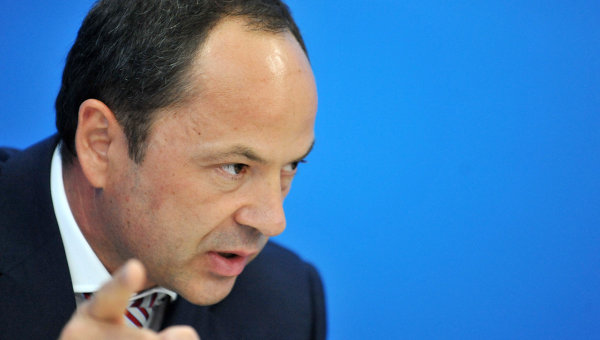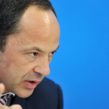
Yatsenyuk’s Party Set to Become Third Force In Ukrainian Politics
Publication: Eurasia Daily Monitor Volume: 8 Issue: 172
By:

Ukrainian Deputy Prime Minister Serhy Tyhypko, a former banker who came third in the 2010 presidential elections, has sacrificed his party’s future for his personal ambitions. His liberal party, Strong Ukraine (SU), will be merged with the ruling Party of Regions (PRU) ahead of the October 2012 parliamentary election. Thus, SU will not become the long-awaited third force in Ukrainian politics. This niche will most probably be filled by the moderate opposition party Front of Change (FP), which is headed by the former parliamentary speaker Arseny Yatsenyuk. Yatsenyuk has refused to join forces with former Prime Minister Yulia Tymoshenko’s Fatherland party, the main opposition force whose popularity is not growing, in contrast to the increasing popularity of FP.
Prime Minister Mykola Azarov, who chairs the PRU, announced at a joint press conference with Tyhypko on August 16 that it was agreed to merge SU with PRU (UNIAN, August 16). The last congress of SU should seal the merger later this fall. Tyhypko’s decision was unsurprising. His party lost the 2010 election long before the campaign was launched. SU has been rapidly losing popularity since Tyhypko joined the PRU-dominated cabinet early last year, as he supervised the unpopular tax and pension reforms. SU’s popularity steadily declined from between 7 percent to 10 percent in opinion polls in spring 2010 to achieve only 3.4 percent in the local elections last October. SU has remained at the same level ever since, scoring 4.5 percent in the most recent opinion poll by the Razumkov think-tank (Ukrainska Pravda, August 22).
In exchange for merging his party with PRU, Tyhypko was apparently promised a good career in that party. Segodnya, a daily linked to PRU, suggested on August 17 that Tyhypko could replace Azarov as prime minister. Tyhypko himself hinted that he could replace Azarov at the helm of PRU (UT1, September 9). Much will depend on the choice by PRU’s informal leader, President Viktor Yanukovych. On the one hand, Tyhypko unlike the majority of the PRU leadership does not come from Yanukovych’s native Donetsk Region and is not linked to any of the party’s “oligarchs,” so he may be viewed as an outsider in the party. On the other hand, he is an experienced politician with in-depth knowledge of the economy, a good speaker with a liberal image and should be well received in the West.
SU’s elimination from the political scene should make it easier for PRU to win the election next year. Without SU, it will face competition in the Russian-speaking and densely populated east and south only from the communists. Moreover, other PRU satellites may follow suit. Parliamentary Speaker Volodymyr Lytvyn recently hinted that his Popular Party may also join PRU (Interfax-Ukraine, August 21). The leader of the party United Center, Viktor Baloha, suggested that he might consider his party’s merger with PRU (UNIAN, August 17).
Meanwhile, FP, which competed with SU for the third force niche in 2009-2010 and came third in the local elections last October, chose the opposite path. In August Yatsenyuk rejected calls from Tymoshenko’s team to form a united opposition party. He explained that two opposition parties would win more seats in parliament than one (Radio Era, August 17). While Tymoshenko is under arrest awaiting a verdict over her role in the 2009 gas deal with Russia, FP has been strengthening its support at her party’s expense. Several influential people’s deputies who were either Fatherland members or allies recently joined FP, including the leader of Our Ukraine caucus in parliament, Mykola Martynenko (Ukrainska Pravda, September 9). Yatsenyuk has reportedly been in talks with Ukraine’s richest businessman, Rinat Akhmetov, regarding the possible financing of his party (Ukrainska Pravda, September 2). Ironically, Akhmetov is a PRU member.
Meanwhile, businessmen have been abandoning Tymoshenko. Tariel Vasadze, the beneficiary of Ukraine’s largest automotive corporation Ukravto, who was elected to parliament from the Tymoshenko Bloc list, was among the most recent defectors, officially joining PRU (UNIAN, September 6). Opinion polls show that Tymoshenko’s arrest did not boost her or Fatherland’s popularity, despite Tymoshenko’s apparent hopes that it would. Meanwhile, FP has been closing the gap on Fatherland. FP scored 9 percent in Razumkov’s opinion poll in August compared to Fatherland’s 14 percent. Last October, Tymoshenko’s party showed the same result while FP scored only 5 percent in Razumkov’s poll.
Yatsenyuk showed similar dynamics early in the 2010 presidential election race. However, he eventually came only fourth behind Yanukovych, Tymoshenko and Tyhypko. This must have been due to problems with his ideological identification as he abruptly changed liberal pro-Western slogans to pro-Russian rhetoric in the middle of his campaign, apparently under the influence of Russian spin doctors hired by FP. This time FP may also have problems with its ideology, which has yet to be formulated. However, the lack of a well-defined ideology has never been a problem for either PRU, which is essentially a club of Donetsk businessmen, or for Fatherland, whose leader Tymoshenko has been a conservative in politics but a socialist in economic matters.




